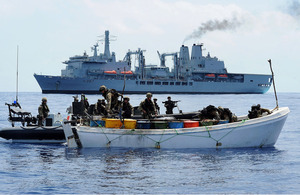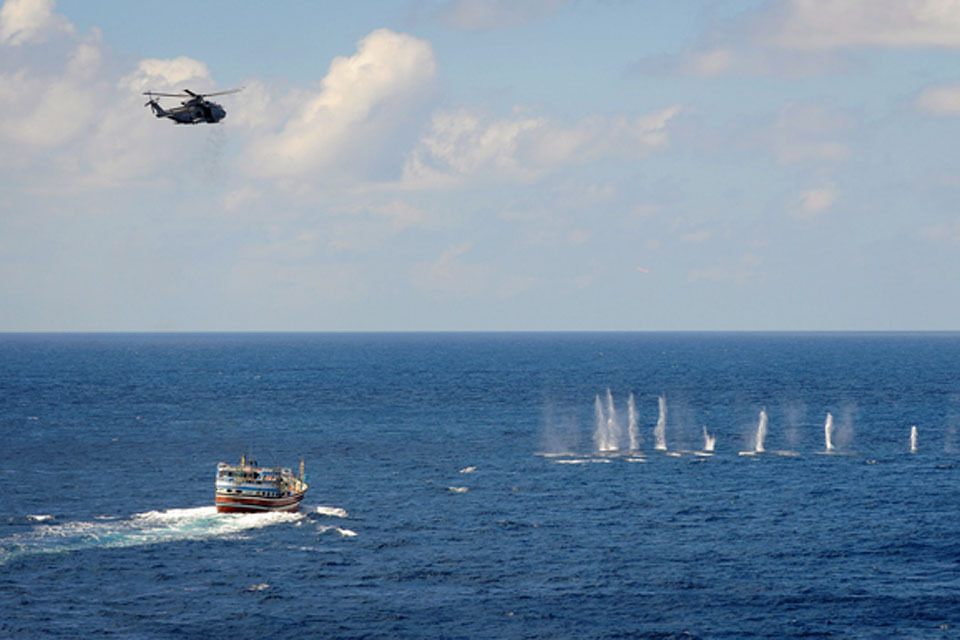Royal Navy helps reduce Somali pirate activity
Following his posting as Commander of the UK Counter-Piracy Task Group, Captain Gerry Northwood, Royal Navy, has written in The Times newspaper about how concerted efforts are helping reduce attacks on merchant vessels.

Royal Marines search a pirate skiff packed with fuel drums with RFA Fort Victoria in the background [Picture: Leading Airman (Photographer) Kyle Heller and LA (Phot) Dave Jenkins, Crown Copyright/MOD 2012]
Captain Northwood writes:
Eleven pirates on board with automatic weapons and rocket-propelled grenades. All comms on ship are down. Crew safe in engine room and have control of engine and steering. Please help.
This message was contained in a plastic water bottle thrown into the Indian Ocean by a member of the security team on board the Italian Merchant Vessel Montecristo, which the previous day had been boarded by Somali pirates.
Desperate times require desperate measures and, in this age of satellites, radar and computers, calling for help via a message in a bottle certainly qualifies as an act of desperation. The security team had attached a strobe light to the bottle, which, fortunately for the 23 Montecristo crew members, was picked up by a US frigate, De Wert.
Not far from her was our ship, the Royal Fleet Auxiliary Fort Victoria, equipped with a Royal Navy helicopter and Royal Marine boarding teams. We were able to answer the master of Montecristo’s plea for help, recapture his ship from the pirates, and return it to him.

The gunner on HMS Somerset's Merlin helicopter fires shots across the bow of a pirated dhow pi[Picture: Leading Airman (Photographer) Kyle Heller and LA (Phot) Dave Jenkins, Crown Copyright/MOD 2012]
The 15 Somalis we detained are now in Italian custody.
Montecristo was lucky; lucky that Fort Victoria could cross 550 miles [885km] of Indian Ocean, the distance from Portsmouth to Edinburgh, before the pirates broke into the crew safe area or ‘citadel’. But she also made her own luck.
She was well prepared for her transit of the Indian Ocean with razor wire defences of her upper decks and superstructure. These at least slowed the pirates down as they boarded the vessel and gave the crew and their unarmed security team time to retreat and barricade themselves into the engine room, and wait for help.
The Montecristo incident is the Somali piracy problem and some of its solutions in microcosm.
A year ago Somali pirates were a regular feature in the news. The number of attacks on merchant vessels was in double figures each month and the number of vessels held by the Somalis for ransom had increased to more than 25.
The advent of Somali piracy in 2008 caught people by surprise, and there was a strong sense that nothing could be done to defeat the pirates.
With no obvious solution to the problems of Somalia ashore, the huge distances involved made it difficult for military forces to protect merchant vessels effectively.
To give some idea of scale, in the four months that Fort Victoria was at sea she operated in an area the size of western Europe, patrolling a front 2,300 miles [3,700km] long - the distance from Berlin to Moscow - and steaming a total of 27,000 miles [43,500km].
But something has been done and the past few months have seen a significant reversal of fortunes. Attacks on merchant vessels are down by 80 per cent and today there are only a handful of vessels held captive off the Somali coast.
Most merchant vessels in the Indian Ocean and the Gulf of Aden are now employing armed and unarmed security teams, along with other protection measures. Collectively this description of merchant ship self-protection goes by the mundane name of ‘industry best management practice’.
Yet these measures work. In most cases they prevent the pirates successfully boarding vessels. This enables the patrolling naval forces to locate the attacking pirate vessels and detain the Somalis for prosecution. All this has served to set back Somali piracy activity to 2007 levels and to reduce their cashflow significantly.
These are tactical successes that must be viewed in the context of a much bigger strategic picture. They depend on a far wider network of operations involving politicians, commercial shipping and other agencies. When Fort Victoria recently captured 14 Somali pirates we were able to take them to the Seychelles for prosecution. Thanks to the support of the British High Commissioner to the Seychelles and his strong relations with members of its government.
But there is an even bigger strategic picture. The pressure put on pirates by military success has created headroom for those tackling the more intractable issues of governance ashore in Somalia. This week’s Somalia Conference in London marks the next stage in restoring calm to the Indian Ocean.